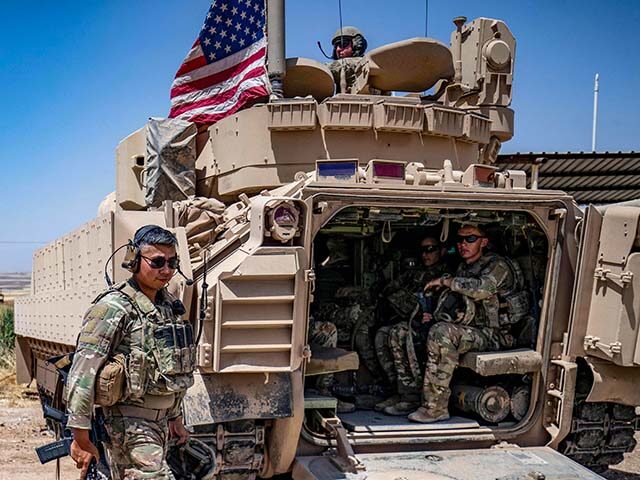Nechirvan Barzani, president of the Kurdistan Region in Iraq, on Tuesday demanded Iraqi Prime Minister Mohammed Shia al-Sudani put an end to Iran-backed Shiite militia attacks on bases housing U.S. personnel.
Iranian proxy forces have launched dozens of attacks in Iraq and Syria since the beginning of the Israel-Hamas war, including drone attacks on a base near Erbil International Airport in Iraq.
The U.S.-led coalition against the Islamic State in Iraq intercepted at least two suicide drones headed for the Erbil base Tuesday morning. A third bomb-laden drone evidently crashed without detonating. No casualties or damage to the Erbil base were reported.
The Pentagon said on Tuesday there have now been 22 attacks against U.S. and coalition forces in Iraq since October 17, plus 18 in Syria.
“This is an extremely dangerous development for Iraq and the Kurdistan Region,” Barzani said at a press conference in Erbil.
“Kurdistan Regional Government calls on Iraq’s prime minister, as the commander-in-chief of the armed forces, to prevent outlaw forces from creating issues for Iraq and the Kurdistan Region. We have this expectation from Iraq’s prime minister,” Barzani said.
Secretary of State Antony Blinken made a similar demand of the Iraqi prime minister during a surprise trip to Baghdad on Sunday. Blinken urged Sudani to “hold accountable those responsible for continuing attacks on U.S. personnel in Iraq and fulfill Iraq’s commitments to protect all installations hosting U.S. personnel at the invitation of the Iraqi government.”
Sudani traveled to Iran the very next day for a meeting with extremist President Ebrahim Raisi, during which Sudani praised the Hamas terrorists, so expectations for him to crack down on Iran’s militia forces in Iraq should be tempered accordingly.
Blinken urged Sudani to “pursue those behind the attacks and fulfill Iraq’s commitment to maintain security” over three weeks ago, but Iran’s proxy forces continue to attack with impunity. If the Iraqi army is pursuing the militia groups that comprise the so-called “Islamic Resistance in Iraq” (IRI), it is a rather leisurely pursuit.
White House National Security Council (NSC) spokesman John Kirby complained about the militia attacks on U.S. forces on Tuesday and said Iran was ultimately responsible for them, but he indicated the Biden administration is not yet prepared to respond – even though up to 39 American personnel have now been injured in the attacks.
“Iran is a destabilizing actor in the region. They support groups like Hamas and Hezbollah. They’re supporting these militia groups that continue to fire rockets at our bases in Iraq and Syria,” Kirby charged in a CNN interview on Tuesday morning.
Asked if these assaults have passed the threshold for an “expanded conflict,” Kirby said “the attacks on our troops are, obviously, deeply concerning,” but the administration’s top priority is to prevent the Israel-Hamas conflict from “widening, deepening, escalating.”
“We’re obviously going to do whatever we have to do to protect our troops in Iraq and Syria, make sure that we make a strong statement about force protection and how much that means to us. But we haven’t seen another nation-state or actor move in demonstrable, major muscle movement ways to try to deepen and widen this conflict as yet,” he said.
The Foundation for the Defense of Democracies (FDD) on Tuesday counted 15 Iran-backed militias across the Middle East, working as Tehran’s “force multipliers” in the Hamas conflict.
Iran has such proxy forces active in Iraq, Syria, Yemen, Bahrain, and Saudi Arabia. Some of them date back to the 1980s, while other relationships were cultivated after the U.S. invaded Iraq in 2003.
FDD described the militias’ relationship with Tehran as “incestuous,” with some paramilitary commanders holding rank in Iran’s Islamic Revolutionary Guard Corps (IRGC). A prominent example outside of Iraq cited in the report is Ansar Allah, more widely known as the Houthis, the Iran-backed insurgency that overthrew the legitimate government of Yemen in 2014 and has launched missiles at Israel during the current conflict.
FDD senior fellow Bill Roggio told Fox News on Tuesday that Iran makes cunning use of these militias to create a “fog” of uncertainty and operate with “plausible deniability.” He said funding sent to Iran by the Obama and Biden administrations helped Tehran arm and train its militia forces, and the Iranians are now using them to exploit a hesitant Biden administration.
“When we released funds to Iran, and then Iran turns around and directs militias to attack us, it creates a lot of confusion. It’s very difficult for the U.S. to fight these wars, because we’re not getting to the root of the problem,” Roggio said.
“The root of the problem is an Iranian regime that has nothing but animosity towards the United States, and until we start hearing that from the administration, there will continue to be confusion,” he added, chiding the Biden administration for treating Iran like a “responsible actor in the international community.”

COMMENTS
Please let us know if you're having issues with commenting.